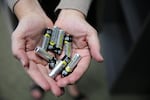
Kristan Mitchell, the executive director of the Oregon Refuse and Recycling Association, holds one of most problematic things haulers collect in in curbside recycling bins: used batteries.
Allison Frost / OPB
If there's one thing haulers, processors, regulators and pretty much everyone connected to the recycling industry agree they'd like to get rid of, it's wishful recycling. You may not be sure if something should go in the curbside bin but you think it should be recycled, so you put it in.
Peter Spendelow, the solid waste analyst with the Oregon Department of Environmental Quality, said with the changing market, there have been adjustments to what's included in the curbside program depending on where you live. And he acknowledges, it can be a challenge to keep up.

Kristan Mitchell of the Oregon Refuse and Recycling Association, and Oregon DEQ's Peter Spendelow.
Allison Frost / OPB
When in doubt, leave it out, experts say — or — call the folks who pick up your waste and ask them.
Executive director of the Oregon Refuse and Recycling Association, Kristan Mitchell, said the things that are collected curbside are basically what processors are able to find markets for.
Mitchell said the worst things found in recycling carts are:
1. Garbage
This is the biggest category and includes stuff that rots like food, and stuff that does not, like dog food bags, textiles, garden hoses, etc. This category also includes dirty diapers, which aren't a huge problem, but one Portland metro area processor pulled out 12,000 diapers (about 6,000 pounds) in one month!
2. Batteries
Batteries can ignite and burn down trucks and facilities. Even those small lithium batteries, like the kind you find in greeting cards and toys, can be dangerous.
3. Plastic Bags
This includes all “film” plastic, like saran wrap, and all other plastic that is wrapped around all kinds of products for packaging.
Mitchell says that film plastic gets tangled around processors’ sorting equipment and causes it to stop working, requiring processors to shut down. Then employees have to spend time doing the potentially dangerous task of cutting the plastic out of the equipment.
Bonus question: What about lids, pizza boxes and take-out containers?
Mitchell said:
- Lids generally fall off and end up in disposal, so leave them off.
- Take-out containers (and plastic clamshells) never were included, and they aren't now.
- As for pizza boxes: No frozen pizza boxes ever, and for take-out, never the bottom half where the pizza sits — but if the lid is clean with no food on it, you can tear it off and put it in.
Both Mitchell and Spendelow said that Oregon has been out in front responding to the market changes and emphasized contamination is a worldwide problem. They said, generally, Oregonians do a good job of recycling, and we have one of the lower contamination rates curbside — at around 9 percent.
Contact "Think Out Loud"
If you'd like to comment on any of the topics in this show, or suggest a topic of your own, please get in touch with us on Facebook or Twitter, send an email to thinkoutloud@opb.org, or you can leave a voicemail for us at 503-293-1983. The call-in phone number during the noon hour is 888-665-5865.
